Spoil The Brute!—By Janet Leigh
I’m an old-fashioned wife who holds the currently unpopular opinion that a husband should be picked up after, catered to, babied, waited on and made comfortable. For instance, if a husband likes to do oil painting at night and leaves everything in a mess because he’s exhausted and sleepy, I believe that it’s a wife’s part of the bargain to straighten up that mess before she goes to bed, to leave clean brushes and painting cloths ready for the next evening’s painting—and to see that a piece of oilcloth is spread under the easel so gobs of paint won’t dry on the rug.
AUDIO BOOK
Twice, though, I’ll admit this picking up after Tony got me into trouble. One day I snatched up a bunch of his clothes from a bedroom chair to sort for the laundry—and suddenly I collapsed to my knees. I thought I’d suffered a heart attack. Gut it was only Tony’s 100-pound weight (which he uses for lifting exercises) tangled in the clothes! Another time I was straightening his sport vests in his closet when bang—a small object in tissue paper fell out of a pocket. It was a cigarette lighter engraved “To My Love.” My normally hazel eyes turned Technicolor green. That night I confronted Tony at the door with “And just who did you buy a gold lighter for?”
“You snoop, you!” he gulped, when he recovered. “Just for that you’re not gonna get it.” And I didn’t—not until Valentine’s Day. And by then the engraving had been altered so there was no doubt about the identity of Tony’s “Love.”
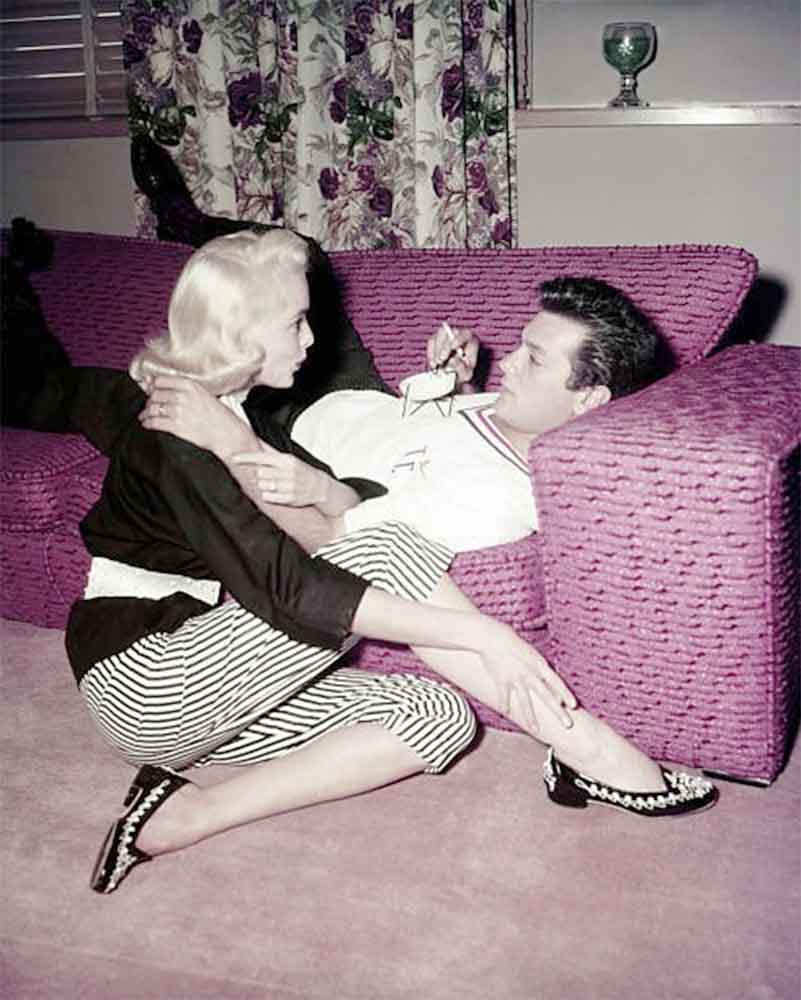
My whole attitude on this subject was crystallized the other night when I got home from the studio before Tony did. Ida May, who comes in daily to clean and cook, was preparing dinner. I gathered Tony’s mail in a neat little pile, set his chair before the TV set, and on the coffee table arranged cigarettes, magazines and the eatables he loves—a plate of caviar, chopped onion and thinly sliced pumpernickel and a jug of cold root beer. Kind of an odd combination, I admit, but Tony likes it. It doesn’t do him any harm, so why should I object? An actress friend of mine, also married, came in at that moment to borrow a book. “What goes on here?” she asked.
“Just Tony’s welcome,” I told her.
“You spoil that wild Hungarian shamefully,” she said. “You’re working, too. Who gets out your welcome?”
I explained that I want to make his home mean something extra-special to Tony—not just a place to hang his hat. My joy is Tony’s happiness. Having him wait on me doesn’t contribute to my happiness. Since a wife’s responsibility is running a house, who is she running it for but her husband? I’m a working member of a partnership, a helpmate; and I want to contribute my share—not just greedily take as much as I can from it.
I know there are working wives who will consider me a traitor to my sex. They’ll probably try to hide this magazine, with its heretical ideas, from their husbands. I know these gals believe that household duties should be split down the center exactly—half for the husband, half for the wife. I don’t. And I’ll be sorry if this gets me thrown out of the Working Wives’ Union.
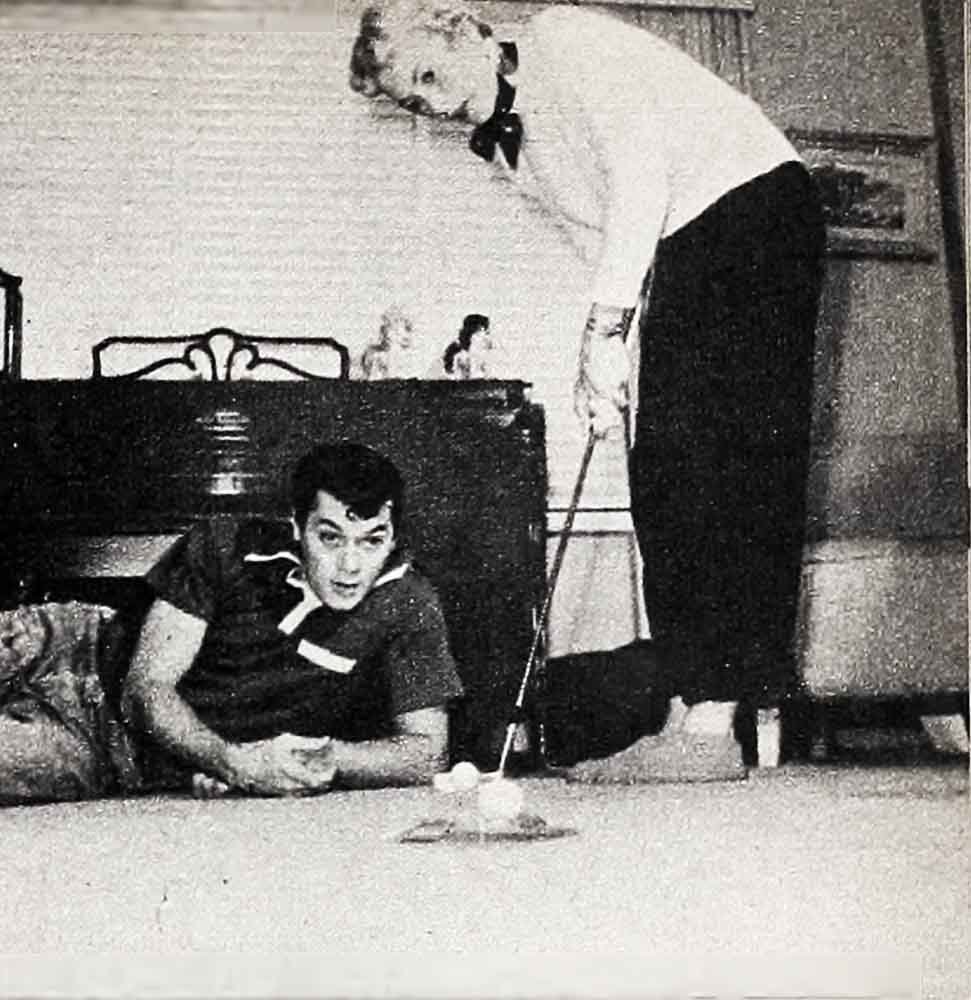
I still remember the morning of my birthday the first year Tony and I were married. Tony (who loves his sleep) got up early to surprise me by making breakfast. I was touched, but the results convinced me that man’s place is not in the kitchen.
Tony served me orange juice, which was very good. But he’d spilled most of it on the floor and let it squirt all over the organdy kitchen curtains. The toast was burnt; the eggs were pure leather; the bacon was mostly raw; the coffee, of which I’m very fond, well we’d better not go into that.
If I’m being too critical, its because I got my own training in housekeeping long ago. Mother and Dad both worked, and after school I kept house and cooked. Mother’s a “fussy” housekeeper- and she says I’m even worse. Disorder drives me frantic; I’ve always been a perfectionist about housekeeping. In those learning days, I had to be efficient and thorough and still have time for my high-school studies and fun with the gang. So I discovered how to budget my time and get rid of waste motion. And, believe me, it came in handy when, at nineteen, while attending the College of the Pacific, I married a student. I worked part-time to help with expenses, continued my senior studies, housed two student boarders, cooked and kept house for the four of us and acted as business manager for my husband’s college band.
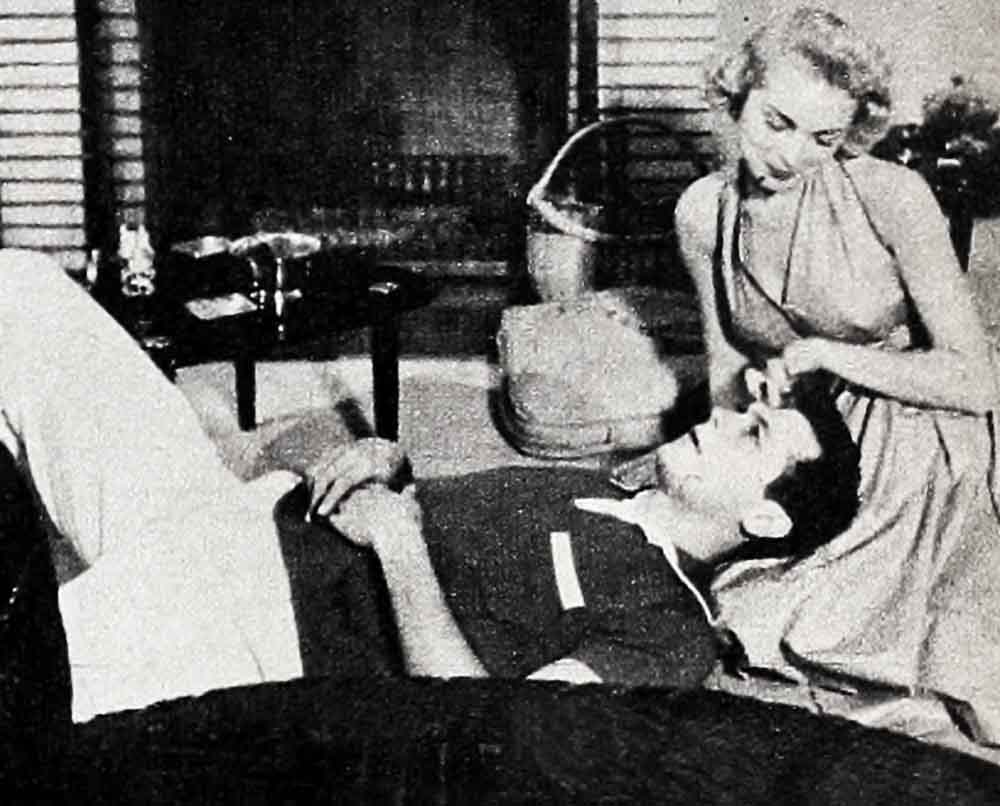
But even that was just duck soup compared to my present existence: Two busy movie careers in one family; continuous picture-making with no time-off between; location and personal-appearance tours; benefits and army-camp entertaining; a home to keep up; a full and varied social life. Tony and I started out in furnished apartments. Now we’re living in our first house, also furnished. For the first time we have a patio for outdoor living, room for all of Tony’s hobbies, a lovely, formal provincial dining room and almost as many closets as we need.
I’d finished “Prince Valiant” just before we moved, and I expected to have everything in apple-pie order before joining Tony on location. So what happened? I was offered a part in the new Martin and Lewis picture, “Living It Up,” and it was such a wonderful role that I just couldn’t turn it down. The moment the cleaners left the house, I began to pack the previous tenant’s linens and china and items we wouldn’t need and then proceeded to get our clothes and possessions put away. Mother suggested that I hire somebody to do it. But with me that’s no good. I must know where things are. I like our personal effects neatly arranged, because then they take up only half as much room and you can find what you want immediately. So I stayed up all night getting things in order, and in the morning left to join Tony.
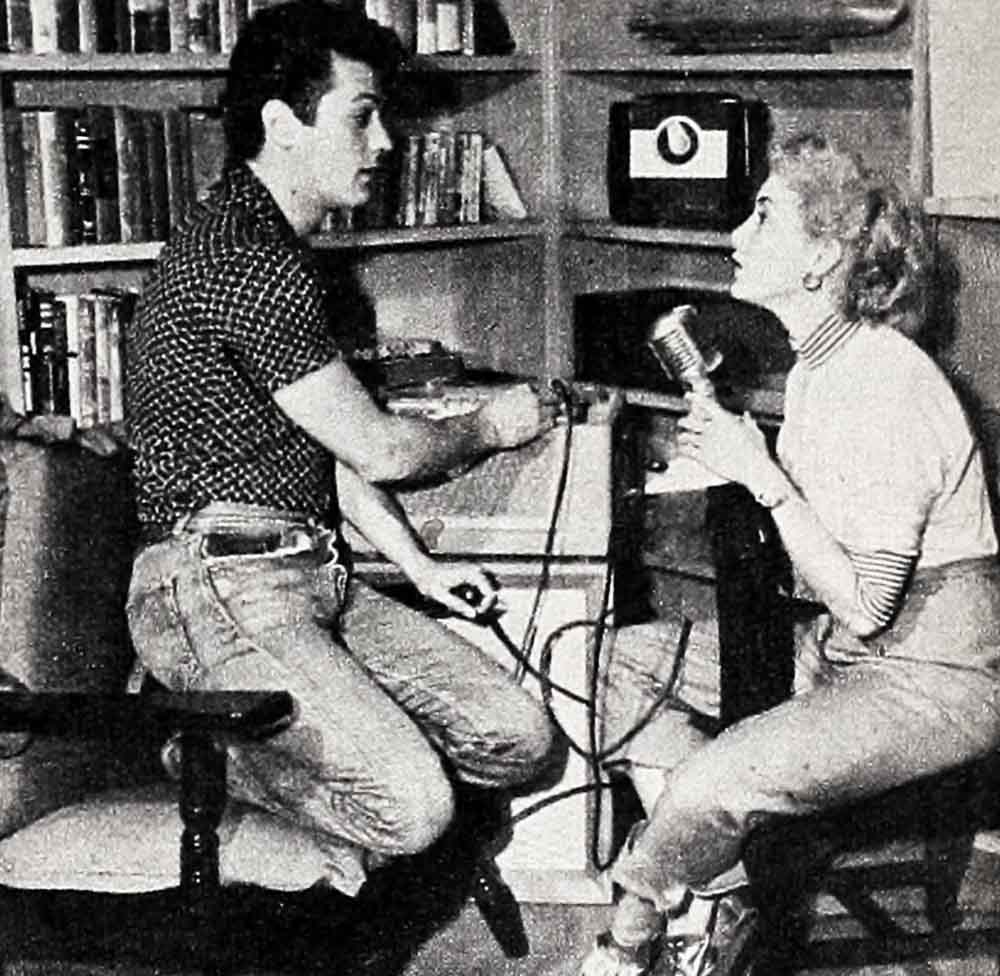
I felt better knowing that we wouldn’t return from a long, tiring trip to find the house looking like a rummage sale. If I know there’s a lot of unfinished business, I can’t go to sleep thinking, “Well, I’ll do it tomorrow.” There is no tomorrow. When it comes, it’s today. It has still more duties and responsibilities. So I’ve found that for me the best system is, “Do it now.” That eliminates mental wear and tear. Once everything is under control, I can relax. And I have plenty of time to be Tony’s wife.
And if I have a household motto it’s “A place for everything and everything in its place.” Canned goods, household supplies, hobby materials are arranged conveniently so a busy person can find them instantly. I’m against putting anything away just to get it out of the way. When I take a dress off, for instance, I air it and then hang it in the closet. But if it needs pressing or mending or a trip to the cleaners, it is not put away. Consequently, everything in my closet is always ready to put on.
All this saves time—and time is what we mortals are shortest of. In the same way, I never do one thing when I can do two things at the same time. While I’m on the phone, I brush my hair, oil my nails or do limbering-up exercises. I make up my lips (a fifteen-minute job) while my hair is being set at the studio. Hairdressing is a time-consuming daily necessity, and I spend the time phoning our parents, friends and business associates. Or I may have my manicure or pedicure (if I need one) or study my script while my hair is drying.
Between scenes at the studio, I read fan mail and note the answers our secretary should make, or go over bills. At the end of each film I write “thank you” notes to all the crew, and I also write them to reporters. This amazes my co-workers. But when people are nice to me I like to let them know that I sincerely appreciate it. If, however, I have a really demanding emotional scene to play, I don’t want to break the mood. Then I catch up on my reading or listen to records.
Sometimes, Tony watches me chewing my pencil and trying to juggle two magazine interviews and one wardrobe fitting into one hour. And the fiend laughs madly. He’s the boy who impetuously arranges for us to be five places the same light, because he can’t say no to people. Then he forgets that he’s made the dates! But I take it meekly. Or I try. This is a wife’s job, too.
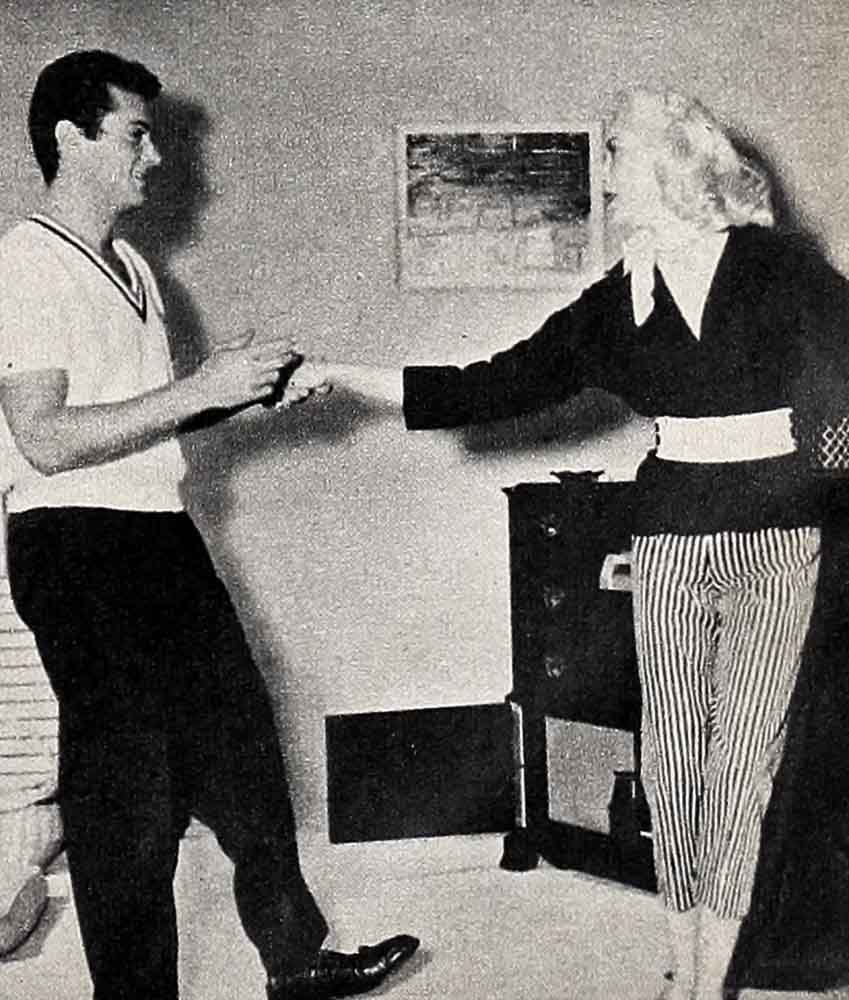
When two people with different personalities and backgrounds marry, there are bound to be clashes in daily living habits. Any Mr. and Mrs. who’ve progressed beyond the melting-eyed honeymoon stage will admit this fact at once. Tony grew up in a medley of New York’s wild, uninhibited neighborhoods. I, in the methodical, well-ordered social pattern of a small California town. Tony is by nature a Bohemian; I’m not. Personally, I don’t believe a wife accomplishes anything by nagging, and I think one marriage partner should leave the other’s personality and habit patterns alone. Tony, for instance, has no sense of time; he forgets ninety per cent of his appointments; he hates and puts off phoning and letter writing. If this didn’t harm him or his career, I wouldn’t intrude. But when he neglects phoning his agent or attending to necessary business or keeping in touch with his friends—then I feel I must speak what Tony calls “a few thousand well-chosen words.”
By nature, he’s untidy. But I can’t say he didn’t warn me about this before we married. “Janie,” he said, “I’m just as orderly as a bargain-basement table after the ladies get through pawing it. I’ve got about as much self-discipline as a kid in an ultra-progressive school. I make my bed only when the sheets have to be changed or when it gets so rumpled that I can’t sleep. I leave my shirts and socks on the chairs. When the chairs get too overloaded, I finally take my clothes to the laundry. Then go out and buy shirts, socks and shorts.”
After we were married, I discovered all this was too, too true. But Tony’s untidy habits didn’t do any real damage. And the household is strictly my domain. So I cheerfully picked up after him and took care of his clothing. Oddly enough, he began to be much more tidy as time went on. And I hadn’t nagged. He just came to realize that tidiness made life simpler.
But about his peculiar (to say the least) eating habits I had to take strong measures. Here he definitely was injuring himself. Every day he’d drink a dozen bottles of orange soda pop, and at irregular intervals he’d eat chili beans, pickles, pea- nut-butter sandwiches and huge amounts of dime-store candy. Naturally, he was never hungry for regular meals! I was convinced this diet could only lead to scurvy and pellagra. This could get to be a thing—if a wife would let it. His idea of a really elegant breakfast was cookies and soda pop! So I prepared a real breakfast and stood over him while he ate it. If I had to leave early for the studio, I left his breakfast with a note: “Eat all of this—or don’t come home tonight!” Ida May prepares well-balanced dinners from menus I devise and little by little Tony has begun to eat more sanely. His diet’s still nothing you’d put on a health chart, but it’s better.
Like most newly-married couples, we had divergent ideas on budgeting. But, with time, we’ve worked out a budget that takes into consideration our expenses and responsibilities and satisfies us both. At first, Tony didn’t have a very realistic attitude toward money. He’d have bought me a bulldozer if somebody said it would make me happy. I’m of Scotch descent, and I firmly believe that a penny saved is a penny earned. We were both very poor during our childhood, but the experience left me with a healthy respect for money and left Tony with the idea that money was something he didn’t want to think about.
Like most women, I’ve always liked to mull it over a while before I make purchases—especially important ones. But Tony used to shop in a whirlwind—and then, many times, regret his purchases. When I first met him he made me shudder with this story! One day he went to a supermarket with his mother, shortly after the family came out from New York. While she bought groceries he went to a furniture store next door and bought living and dining-room furniture, including all the lamps and end tables!
Tony needs lots of sleep—as much as fifteen hours if he has fifteen hours to spare. I’m a six-hour girl, up with the rooster’s crow. Tony wakes up slowly and slightly groggy; I’m cheerful and ready to go. I like quick showers; he likes relaxing tubs. It’s all a matter of metabolism, of life habits. But early in our marriage Tony saw that I was overdoing, and he insisted that I take more rest. I’m naturally cooperative, anxious to do all I’m asked to do, outgoing and gregarious; and I hate to pass up any social activity that sounds like fun. But Tony pointed out that I must cut down or risk my health. One day at the studio, without knowing why, I burst into tears, then collapsed. The doctor diagnosed it as exhaustion and the skin rash on my arms as shingles. Tony was right, and I took his advice.
I’ve taken his advice, too, about clothes. Now I never buy anything except on approval. If Tony doesn’t like it—back it goes.
By nature I’m inclined to be a little over-enthusiastic and to talk too much. “You scream and holler and whoop it up if I tell you something exciting while we’re walking,” Tony says, “and cars stop and people turn around.” But he’s exaggerating. Maybe twice people have looked around, but never did they get out of their cars to see if the young man was slugging his lady. Anyway, I’ve learned to hold my tongue, at least while he’s reading.
But not when we go into our loony routines—scktick-lok—meaning crazy acting bits which we swing into on the slightest provocation. Sometimes we don’t even need provocation. We’re both volatile, high-humored characters with over-developed funny bones. We both enjoy impromptu nonsense acts as an escape valve. That’s why we’ve collected a zany group of friends, with Jerry Lewis as the leader.
We’ve given keys to our house to all our friends. And that explains why, when we come home from the movies, we might find a group of them waiting for us, quite at home. Tony will say, “You know my wife—Janet Blair.” And I’ll say, “You’ve met my husband—Tony Dexter.” And then we’re off on one of our routines.
Life is good for Mr. and Mrs. Tony Curtis. And I don’t think it’s just coincidence that custom puts “Mr.” first in that combination. It’s the best way to keep the combination together.
THE END
It is a quote. PHOTOPLAY MAGAZINE FEBRUARY 1954
AUDIO BOOK


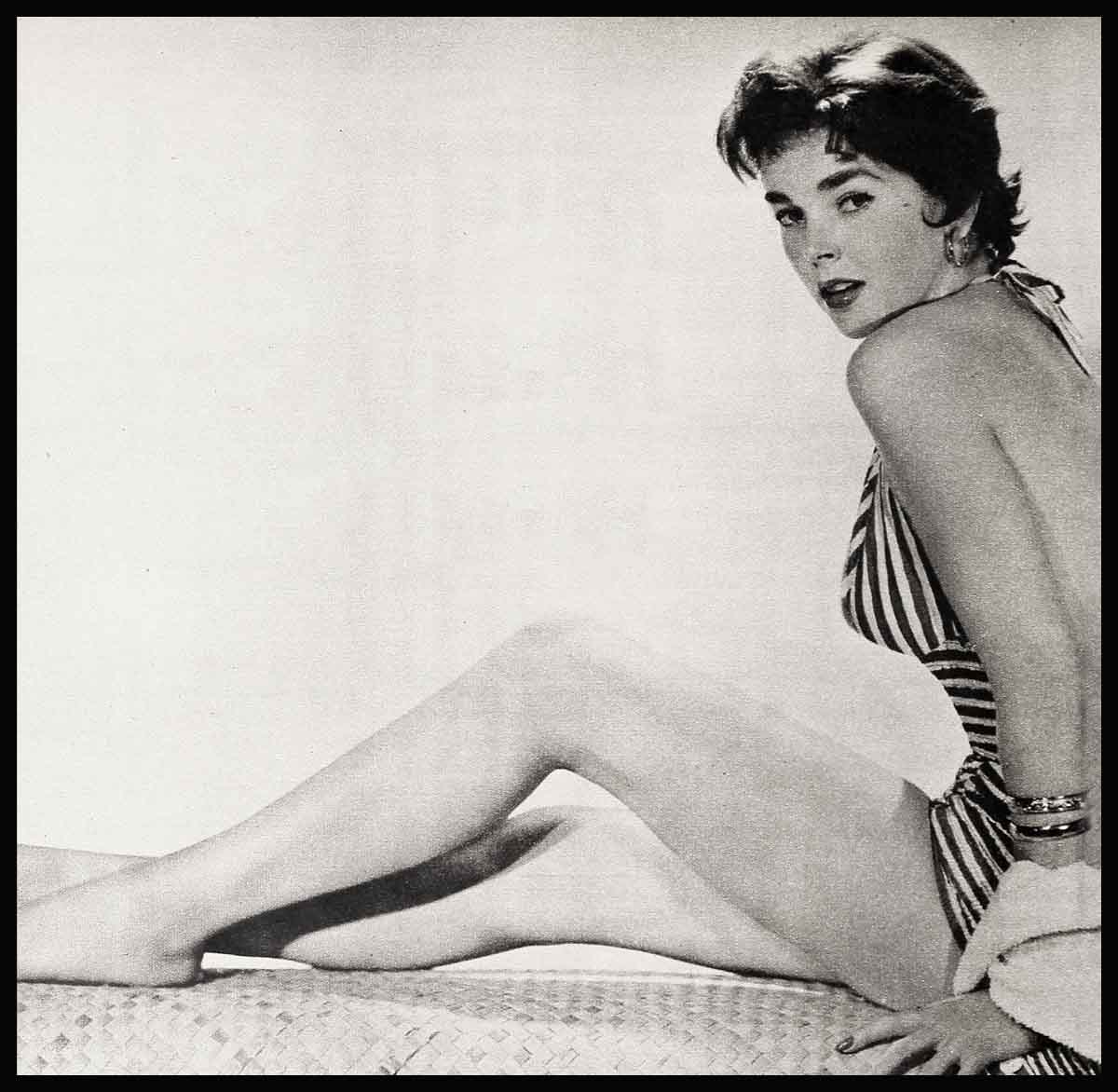

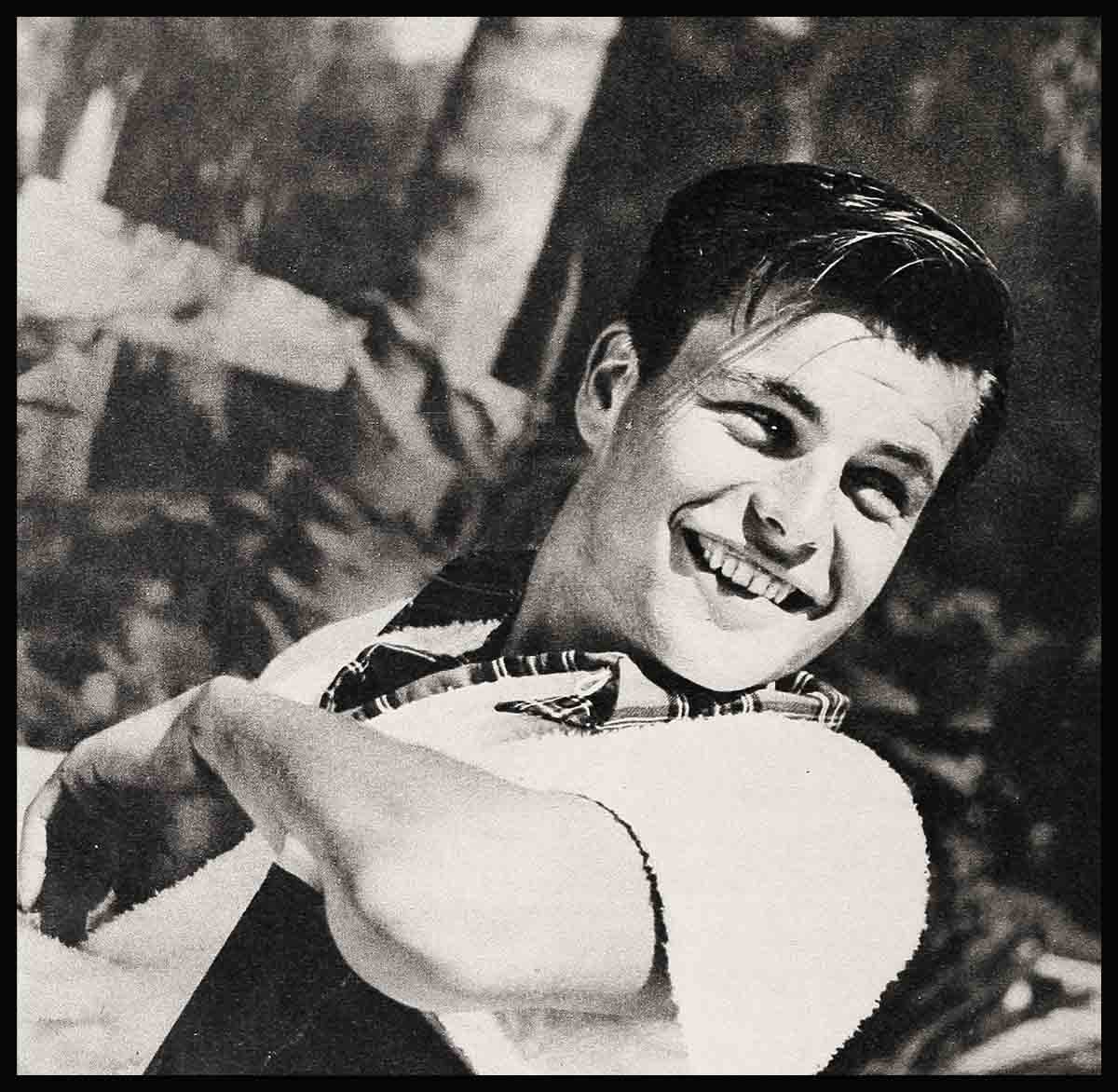
No Comments